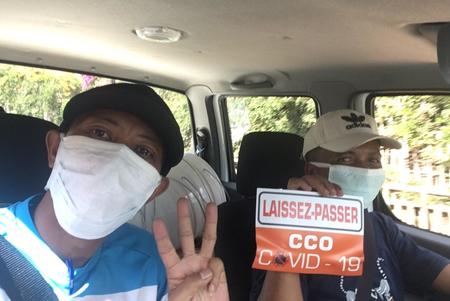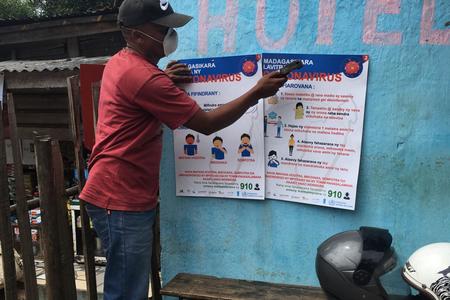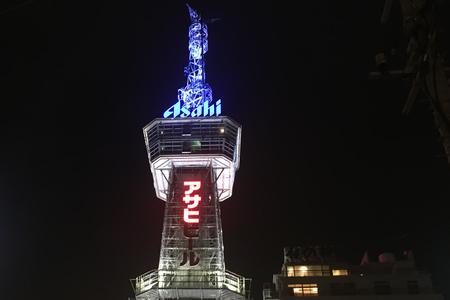We're deploying our water, handwashing and hygiene expertise to prevent the spread of COVID-19 in more than 30 countries. Our work has never been more relevant or more urgent.
We're committed to keeping you updated on the programs that are only made possible by your ongoing support.
What is WaterAid doing to help reduce the spread of COVID-19?
We're urgently refocusing our support to help people in the communities where we work to stay safe and reduce the spread of COVID-19:
- WaterAid is creating COVID-19 specific responses by providing national communications, information, materials and training on water, sanitation and hygiene to frontline health workers and health posts in rural areas.
- We are providing education to locals about low-cost solutions for handwashing infrastructure, such as tippy taps.
- We are providing information on how to make soap from locally available materials, to enable handwashing with soap and water.
- WaterAid is conducting direct community outreach and visiting rural communities to spread the World Health Organisation and National Department of Health awareness messaging to prepare locals for COVID-19.
Country Programs
Cambodia
In Cambodia, 29% of the population do not have access to a handwashing facility with soap and water. In response to the COVID-19 pandemic, the WaterAid Cambodia team in Kampong Chhnang have been supporting the provincial and district governments in getting messages out to some of the rural communities in Chul Kiri district.
This effort has been led by WaterAid and the Provincial Department of Rural Development, who are responsible for community health, sanitation and hygiene. WaterAid have supported with materials and hiring vehicles with loudspeakers. It builds on their support to the provincial and district water, sanitation and hygiene coordination working groups.
Timor-Leste
Only 28% of people in Timor-Leste have access to handwashing facilities with soap and water. In response to COVID-19, the WaterAid Timor-Leste are shifting their work to focus on responses to the pandemic.
WaterAid Timor-Leste is assisting the Ministry of Health in their response to health and hygiene promotion activity to #COVID19. The team is also actively sharing WHO messaging on hygiene and preparedness. WaterAid is also creating COVID-19 specific responses by providing information, materials and training on water, sanitation and hygiene to frontline health workers and health posts in rural areas
The team is also joining the COVID-19 Risk Communication & Community Engagement Group at national level under the Ministry of Health to provide hygiene expertise and support the adaptation of COIVD-19 awareness materials to be inclusive, appropriate and equitable.
On 23 March 2020 WA TL was involved in establishing a technical COVID-19 taskforce team in Manufahi Municipality. The Municipal Administrator requested to appoint a representative of WaterAid Timor-Leste, to the secretariat for partnership matters.
The support from WaterAid Timor-Leste together with their partners Strive for the Future (F-LBF), Women for Sustainable Action (FAS) and Strive for Change (LBM) to partner with the taskforce is defined in two parts:
- Human resource support to strengthen the WASH sector in coordination and activity planning, together with budget for the technical working group for prevention of COVID-19 in Manufahi.
- Material support comprising six large water tanks for public handwashing stations, 15 disinfectant tanks, handwashing soap, disinfectant materials, 30 raincoats and twp boxes of bleach.
Papua New Guinea
Handwashing infrastructure and awareness are very low in PNG and less than 1% of rural households have handwashing facilities with soap and water. To respond to COVID-19 in PNG, WaterAid is implementing a major national hygiene and COVID-19 awareness campaign. This national campaign will run on billboards, print advertising, radio, television and social media to promote hygiene and COVID-19 awareness. WaterAid will use this campaign to:
- Provide COVID-19 awareness and education
- Educate people on hand hygiene and COVID-19 prevention behaviours such as:
- Handwashing with soap
- Respiratory hygiene
- Maintaining social distancing
- Cleanliness and food hygiene
The team is also providing information on how to make soap from locally available materials, to enable handwashing with soap and water and provide and educate locals with low-cost solutions for handwashing infrastructure, such as tippy-taps.
WaterAid is conducting direct community outreach. WaterAid staff have been visiting rural communities to spread World Health Organisation and National Department of Health awareness messaging to prepare locals for COVID-19. WaterAid has been working to dispel any myths related to COVID-19 and provide facts and information on the pandemic, to ensure preparedness.
WaterAid knows that people who experience marginalisation such as those with disabilities, living with a chronic illness, those who are poorer or lack access to safe water, sanitation and hygiene are more vulnerable to economic and health outcomes of the COVID-19 pandemic. Therefore, we have created simple COVID-19 messaging on flyers, in collaboration with The Disabled Persons and East Sepik Council of Women to ensure outreach accounts for the needs of women and people living with a disability.
Read our article on COVID-19: Women, Water, Sanitation and Hygiene in the Market Places of Papua New Guinea
Bangladesh
WaterAid Bangladesh is aiming to reach close to 10 million people with their hygiene promotion activities. They are promoting handwashing using social media campaign, awareness videos and placing banners in schools and hospitals.
Further, they are providing free handwashing devices at public areas such as bus stops, railway stations, markets and shopping malls to reach 100,000 people. They have also launched a campaign called ‘Fight Corona’ reaching over two million people online. Further, they are collaborating with top radio channels to deliver multiple messages during peak hours reaching one million people.
Additionally, WaterAid Bangladesh has developed a list of technological options for handwashing stations based on geographical context, space, accessibility and costing of materials.
Contactless (with paddle) handwashing devices are a low cost yet highly effective solution for low income communities. Building on lessons from the current developments, Water Bangladesh took sustainable and community led approaches to implement a project triggering handwashing. People of Dholpur community are using the newly installed handwashing device and maintaining the maximum social distance that they can afford inside such densely populated areas.
Further, the numbers of infected patients is increasing every day in Bangladesh. Therefore the team is working with local partners to bring hygiene knowledge and behavioural practices to thousands of marginalised people across 13 districts in the country.
Ghana
WaterAid Ghana has been utilising radio, social media, such as their Instagram, to highlight and answer frequently asked questions regarding coronavirus, to give tips on how to protect yourself and uploading videos and images to promote handwashing.
Since Ghana confirmed two cases of COVID-19 in March, WaterAid Ghana has been working with the government and Ghana Health Services by providing hygiene materials and other personal protective equipment to the Bongo and Kassena Nankana West Districts, to help fight against COVID-19. WaterAid Ghana hopes this will go a long way to protect doctors, nurses and other healthcare workers in the Bongo and Kassena Nankana West District, as they take care of their patients.
They have launched a ‘I Stand for Clean Hands Campaign’ to encourage good hygiene. Additionally, they have donated 30 hygiene bucket sets comprising 100-litre buckets with waste bins, tissue and soap; non-contact thermometers; 2 boxes of masks, 350 5-litre gallons of liquid soap and 350 bottles of 250ml liquid soap to health workers in Bongo and Kassena Nankana West District.
India
WaterAid India has launched an eight-day campaign titled Good Hygiene Practices to Prevent COVID-19, which launched on April 4th. The campaign is running through digital posters, audio messages and video messages in seven languages.
The campaign sends one message every day for eight days, in order to reach out to the communities in their project areas across India in times of the nation-wide 21 days lockdown. The campaign will also run on community radio, local A/V channels, loudspeakers in the community and social media.
Challenges faced by women and girls related to menstruation are being exacerbated during the Covid pandemic. This article from India highlights the increased difficulty of accessing safe and appropriate menstrual materials.
Madagascar
Due to the remote communities and villages in Madagascar, two WaterAid staff members conducted a road trip to ensure that as many people as possible know about the virus and are informed about the best methods of prevention.
When asked why it was so important, Liva, the driver responded:
"There are so many people here in Madagascar who don’t know what it is, how it spreads, how to avoid it and many people don’t even have soap or something to wash their hands. I am motivated by my humanitarian spirit, patriotism and will do what I can to help people to protect themselves from the virus. So let’s do it, buddy, to keep everyone safe from coronavirus."
Liva, the WaterAid Madagascar driver
Malawi
The WaterAid Malawi team are currently working closely with the government to create messages for public health materials, jingles for radio and phone ringtones. Also providing handwashing facilities and other supplies in hospitals.
They are working on a story of ‘how men play their part in collecting water in times of crisis’. In order to ensure everyone everywhere is well protected against COVID-19, WaterAid Malawi has come up with an intervention where no one has to touch the hand soap bottle or know that opens the tap connected to the water bucket.
Zambia
WaterAid Zambia has been working with the Ministry of Health on COVID-19 preparedness for both prevention and response.
This has involved developing social distancing stickers for use in supermarkets, banks and other public places. They have also provided mobile phones for use at the official COVID-19 call centre, which was overwhelmed with calls. They have also worked with local authorities and the Ministry of Health to provide hands-free washing stations and materials such as sanitisers to support good hygiene practices.
Jingles have been produced for radio promoting good hygiene behaviours, social distancing stickers created for public spaces such as supermarkets and banks and they are working with celebrities and artist to record videos that are being posted on social media. For example, Pompi, a popular musician, produced a video on handwashing and promoted a #handwashingchallenge #Kutuba2020.
Nepal
WaterAid Nepal has been creating and distributing flyers and posters in many local languages, with information on how to practice good hygiene. Their hygiene promotion campaign has also included COVID-19 information on posters across 70 bus routes, in public toilets and health care facilities.
WaterAid Nepal has supplied 50 contactless handwashing stations inside Kathmandu Valley and 25 in Lahan Municipality, Siraha district. WaterAid as a WASH agency aims to support to enable access to handwashing stations where essential in all current working areas.
WaterAid Nepal (WAN) is implementing a Municipality-wide equitable WASH services project titled ‘The Beacon Project’, a joint initiative of Anglian Water, their Alliance partners, WaterAid, Lahan Municipality and Nepal Water Supply Corporation (NWSC) in Lahan Municipality
Myanmar
WaterAid Myanmar is using social media and other promotional methods using visual illustration to raise awareness to reach 400,000 people in densely populated villages.
They are using social media to post videos, images and messages which are culturally representative to engage with around four million people. They are planning to continue to develop awareness jointly with the government, corporate houses and other CSOs to reach a wide range of population.
First image: In Myanmar we are running a mass COVID-19 and hygiene public awareness campaign, including posters in public places. For example, in cooperation with Mandalay Youth Network, we distributed 100 vinyl signs with COVID-19 prevention messages in Kyaukpadaung township in Mandalay Region, including in Kyaukpadaung town, Popa hospital and 14 villages. May 2020.
Second image: We are also organising competitions to encourage villages to build low cost handwashing stations, known as tippy taps. Residents from the partaking villages will have 15 days to set up their own tippy tap and there is prize money available for the winner. June 2020.
Third image: To help keep essential workers safe, we provided personal protective equipment kits including surgical masks to cleaners working at quarantine centres in Hlaing Tharyar township. June 2020.
Pakistan
WaterAid Pakistan is working WHO and UNICEF and government. They have built 60 handwashing facilities across the country in main centres where people travel.
The lastest is four handwashing stations at various locations in Muzaffargarh, Punjab, with over 5,000 estimated daily users. Temporary handwashing facilities are also being installed in quarantine centres, healthcare facilities and fruit and vegetables markets.
They are also putting up advertisements, developing animation in Urdu (the main language in Pakistan) to distribute through social media, creating public service announcements and working with celebrities. For example, a radio campaign is now to be delivered by a well-known DJ and given to partners to cascade.
We installed handwashing facilities in Children’s Hospital Lahore, one of the largest children hospitals in Punjab. June 2020.
Burkina Fasso
WaterAid Burkina Faso is in discussion with key partners to develop a minimum package for handwashing in healthcare facilities and public spaces. They have developed key reminders for handwashing and COVID-19 response posters, and are using local media and radio adverts to encourage positive hygiene behaviours and to prevent the spread of coronavirus.
Through education officials in the provinces of Boulgou and Kourittenga (provincial directorates), WaterAid Burkina Faso has donated a large batch of 156 handwashing devices and 312 balls of soap to schools. The handing-over ceremonies were organised on 06, 08 and 11 May 2020. In summary, 31 primary schools and 8 post-primary schools were each provided with at least four handwashing devices and eight soap balls. This donation is a contribution from WaterAid and its partners to the efforts to combat the pandemic and to the preparatory measures undertaken by the government for the forthcoming resumption of classes.
Nigeria
WaterAid Nigeria is continuing to promote and lead its ongoing 'Clean Nigeria Campaign,' while adapting the messaging to focus on COVID-19. They are using social media to promote messages and raise awareness. The team have also developed press releases and engaged with partners in states to share the information though broadcasts and translation into local dialects.
eSwatini
In response to COVID-19, WaterAid Eswatini held an event called “My cleanliness, is my life,” where they supplied five group handwashing facilities in rural growth areas, as well as hygiene hampers for the market vendors operating in these areas, to ensure there is access to handwashing. Close to 150,000 will be able to use these facilities, and the team have secured a commitment from the local governments and community to leader to ensure these facilities are maintained to allow sustained handwashing practice beyond the current pandemic.
Nicaragua
Nicaragua has fallen into phase 4 (community transmission) and field work is being put on hold for the next 15 days starting today. Before this, there has been lots of work in Nicaragua developing prototypes of portable handwashing stations where there is no piped water, supplying and improvising handwashing units to accompany rainwater catchment systems. Also contribution to a national campaign under the banner of the Nicaragua WASH Network (RASNIC) for a Healthy Nicaragua (Nicaragua Saludable) with safe water and hygiene to prevent COVID-19.
Senegal
In order to respond to the fight against COVID-19, WaterAid West Africa, on 8 May, the team supplied handwashing facilities and also hygiene products (soap and bleach and sanitary napkins) to the town hall of the largest city of Senegal. These donation are mainly intended to the children from Islamic boarding school, a very exposed population to the COVID-19 infection due to the bad hygienic conditions. Next step for the team is donations to the Hygiene Department of the Health Ministry.
Sierra Leone
First and second images: In Sierra Leone, we are distributing handwashing stations, soap and hygiene materials to healthcare facilities in our programme areas to help control the spread of COVID-19. With limited public health infrastructure, slowing the spread has been critical to protecting Sierra Leone’s population of nearly 8 million. May - June 2020.
Third image: We've also donated assorted stationery items, fuel, radio airtime and internet service to the Bo District COVID-19 Emergency Operations Centre. June 2020.









































































